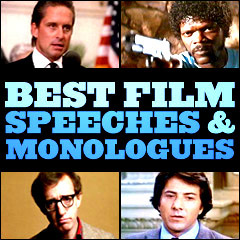|
Best Film Speeches and Monologues
|
|
Title Screen
|
Film Title/Year and Description of Film Speech/Monologue |
Screenshots
|
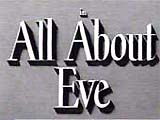
|
All About
Eve (1950)
Screenwriter(s): Joseph L. Mankiewicz
 The
Introduction of Eve Harrington The
Introduction of Eve Harrington
Theatre critic Addison DeWitt (George Sanders)
narrated the film's opening when he introduced the key characters,
especially Eve Harrington (Anne Baxter):
We know her humility, her devotion, her
loyalty to her art, her love, her deep and abiding love
for us, for what we are and what we do, the theater. She
has had one wish, one prayer, one dream - to belong to
us. Tonight, her dream has come true. And henceforth, we
shall dream the same of her. Eve. Eve the Golden Girl,
the Cover Girl, the Girl Next Door, the Girl on the Moon.
Time has been good to Eve. Life goes where she goes. She's
the profiled, covered, revealed, reported. What she eats
and what she wears and whom she knows and where she was,
and when and where she's going. Eve. You all know all about
Eve. What can there be to know that you don't know?
|

|

|
All
About Eve (1950)
Screenwriter(s): Joseph L. Mankiewicz
 Perfect
Blackmail and Exposure of Eve's Duplicity Perfect
Blackmail and Exposure of Eve's Duplicity
DeWitt (George Sanders) blackmailed Eve Harrington
(Anne Baxter), exposing her lies and treachery privately:
That I should want you at all suddenly strikes
me as the height of improbability, but that, in itself,
is probably the reason. You're an improbable person, Eve,
and so am I. We have that in common. Also a contempt for
humanity, an inability to love and be loved, insatiable
ambition - and talent. We deserve each other...and you
realize and you agree how completely you belong to me?
This was followed by his reaction to her reluctance
to go on stage after he "claimed"
her: "Couldn't go on! You'll give the performance of your
life."
|
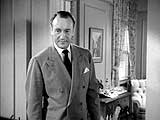
|
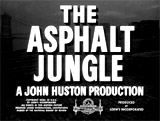
|
The
Asphalt Jungle (1950)
Screenwriter(s): Ben Maddow, John Huston
 "Suppose
We Had No Police Force...The Battle's Finished. The Jungle
Wins" "Suppose
We Had No Police Force...The Battle's Finished. The Jungle
Wins"
Police Commissioner Hardy (John McIntire), pleased
that "maybe we're getting somewhere at last" in the
fight against crime, held a press conference after the arrest
of the duplicitous cop Lt. Ditrich (Barry Kelley) (the one
dishonest cop in a hundred). During his impassioned, moralizing
speech near the end of the film, Hardy turned on four radio
speakers (lined up in a row behind him) that broadcast crime
reports (a robbery, two men with guns, a shooting and a strong-arm
slugging), and then announced that crime didn't pay.
He created sensational headlines for the media
when he melodramatically postulated what the city (or entire
world) would be like without urban law enforcement to keep
back "the jungle" of career criminals ("predatory
beasts...without human feeling or human mercy"):
Let me put it this way. It's not anything
strange that there are corrupt officers in police departments.
The dirt they're trying to clean up is bound to rub off
on some of 'em, but not all of 'em. Maybe one out of a
100. The other 99 are honest men trying to do an honest
job. Listen... (One by one, he flipped the switch on
police radios behind him that broadcast crime reports)
I know you're police reporters and you hear
this all day long, but I want you to listen with your conscience,
not just your ears. We send police assistance to every one
of those calls 'cause they're not just code numbers on a
radio beam, they're cries for help. People are being cheated,
robbed, murdered, raped. And that goes on 24 hours a day,
every day in the year. And that's not exceptional, that's
usual. It's the same in every city of the modern world.
But suppose we had no police force, good or
bad. Suppose we had (he flipped off all four radios)
- just silence. Nobody to listen, nobody to answer. The battle's
finished. The jungle wins. The predatory beasts take over.
Think about it. Well gentlemen, three men are in jail [Gus,
Cobby, Doc], three men dead [Emmerich, Brannom, Louis], one
by his own hand. One man's a fugitive [Dix] - and we have
reason to believe seriously wounded. That's six out of seven,
not bad. And we'll get the last one too. In some ways, he's
the most dangerous of them all. A hardened killer. A hooligan.
A man without human feeling or human mercy.
|
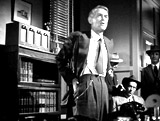
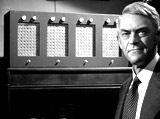
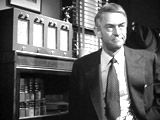
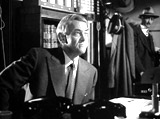
|
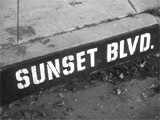
|
Sunset Boulevard (1950) (aka Sunset
Blvd.)
Screenwriter(s): Charles Brackett, Billy Wilder, D.M. Marshman, Jr.
 Dead
Man's Opening Voice-Over Narration Dead
Man's Opening Voice-Over Narration
Play clip (excerpt): 
Screenwriter Joe Gillis (William Holden) narrated
an opening off-screen voice-over about his death as he floated
face down in a swimming pool:
Yes, this is Sunset Boulevard, Los Angeles,
California. It's about five o'clock in the morning. That's
the Homicide Squad - complete with detectives and newspapermen.
A murder has been reported from one of those great big
houses in the ten thousand block. You'll read about it
in the late editions, I'm sure. You'll get it over your
radio and see it on television because an old-time star
is involved - one of the biggest. But before you hear it
all distorted and blown out of proportion, before those
Hollywood columnists get their hands on it, maybe you'd
like to hear the facts, the whole truth. If so, you've
come to the right party. You see, the body of a young man
was found floating in the pool of her mansion - with two
shots in his back and one in his stomach. Nobody important,
really. Just a movie writer with a couple of 'B' pictures
to his credit. The poor dope! He always wanted a pool.
Well, in the end, he got himself a pool - only the price
turned out to be a little high.
|
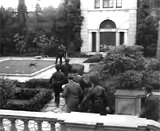
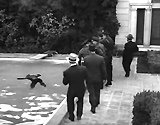
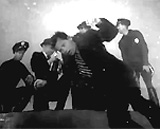
|

|
Sunset Boulevard
(1950)
Screenwriter(s): Charles Brackett, Billy
Wilder, D.M. Marshman, Jr.
 Delusional
Descent Down the Stairs Delusional
Descent Down the Stairs

Play clip (excerpt): 
Silent film star Norma Desmond (Gloria Swanson)
presented a demented, delusional speech as she descended her
staircase to be arrested at the film's conclusion:
I can't go on with the scene. I'm too happy!
Mr. De Mille, do you mind if I say a few words? Thank you.
I just want to tell you all how happy I am to be back in
the studio making a picture again! You don't know how much
I've missed all of you. And I promise you, I'll never desert
you again because after Salome we'll make another
picture, and another picture! You see, this is my life.
It always will be! (In a whisper) There's nothing
else - just us - and the cameras - and those wonderful
people out there in the dark. All right, Mr. De Mille,
I'm ready for my close-up.
|
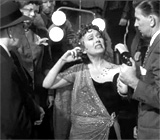
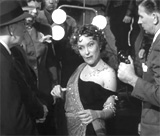
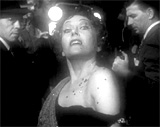
|
